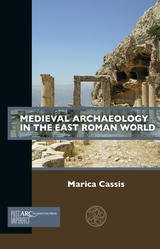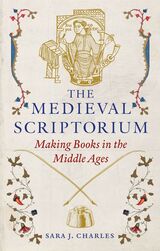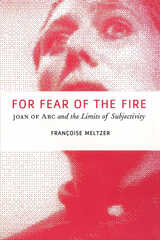
Engaging a number of theorists, and alternating between Joan's historical and cultural context, Meltzer also explores the ways in which postmodern thinkers question subjectivity. She argues that the way masculine subjects imagine Joan betrays their fear of death and necessitates the role of women as cultural others: enigmatic, mysterious, dark, and impossible. As such, Joan serves as a useful model of the limits and risks of subjectivity. For Meltzer, she is both the first modern and the last medieval figure. From the ecclesial jury that burned her, to the theorists of today who deny their attraction to the supernatural, the philosophical assumptions that inform Joan's story, as Meltzer ultimately shows, have changed very little.
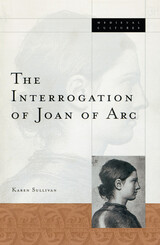
A radical reassessment of the trial of Joan of Arc that gives a new sense of Joan in her time.
The transcripts of Joan of Arc’s trial for heresy at Rouen in 1431 and the minutes of her interrogation have long been recognized as our best source of information about the Maid of Orleans. Historians generally view these legal texts as a precise account of Joan’s words and, by extension, her beliefs. Focusing on the minutes recorded by clerics, however, Karen Sullivan challenges the accuracy of the transcript. In The Interrogation of Joan of Arc, she re-reads the record not as a perfect reflection of a historical personality’s words, but as a literary text resulting from the collaboration between Joan and her interrogators.
Sullivan provides an illuminating and innovative account of Joan’s trial and interrogation, placing them in historical, social, and religious context. In the fifteenth century, interrogation was a method of truth-gathering identified not with people like Joan, who was uneducated, but with clerics, like those who tried her. When these clerics questioned Joan, they did so as scholastics educated at the University of Paris, as judges and assistants to judges, and as pastors trained in hearing confessions.The Interrogation of Joan of Arc traces Joan’s conflicts with her interrogators not to differing political allegiances, but to fundamental differences between clerical and lay cultures. Sullivan demonstrates that the figure depicted in the transcripts as Joan of Arc is a complex, multifaceted persona that results largely from these cultural differences. Discerning and innovative, this study suggests a powerful new interpretive model and redefines our sense of Joan and her time.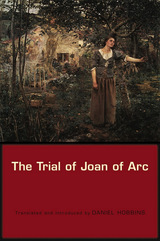
No account is more critical to our understanding of Joan of Arc than the contemporary record of her trial in 1431. Convened at Rouen and directed by bishop Pierre Cauchon, the trial culminated in Joan's public execution for heresy. The trial record, which sometimes preserves Joan's very words, unveils her life, character, visions, and motives in fascinating detail. Here is one of our richest sources for the life of a medieval woman.
This new translation, the first in fifty years, is based on the full record of the trial proceedings in Latin. Recent scholarship dates this text to the year of the trial itself, thereby lending it a greater claim to authority than had traditionally been assumed. Contemporary documents copied into the trial furnish a guide to political developments in Joan's career—from her capture to the attempts to control public opinion following her execution.
Daniel Hobbins sets the trial in its legal and historical context. In exploring Joan's place in fifteenth-century society, he suggests that her claims to divine revelation conformed to a recognizable profile of holy women in her culture, yet Joan broke this mold by embracing a military lifestyle. By combining the roles of visionary and of military leader, Joan astonished contemporaries and still fascinates us today.
Obscured by the passing of centuries and distorted by the lens of modern cinema, the story of the historical Joan of Arc comes vividly to life once again.
READERS
Browse our collection.
PUBLISHERS
See BiblioVault's publisher services.
STUDENT SERVICES
Files for college accessibility offices.
UChicago Accessibility Resources
home | accessibility | search | about | contact us
BiblioVault ® 2001 - 2024
The University of Chicago Press



